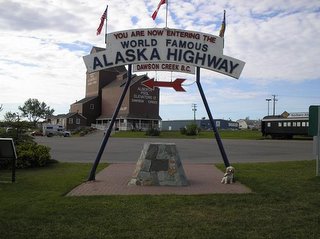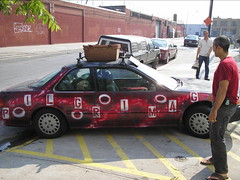They all started out with bad directions"
- Tom Waits

Light is both a wave and a particle. Light particles - photons - connect all things which we can see, and through the strange properties of relativity, the photons exist in a timeless state. During its journey from emission to interaction to reception, it has no concept of beginning or end - both are instantaneously occurring, always existing, to the photon. Though the light we receive from the sun takes 8 minutes to reach us across 93 million miles of darkness, to the light itself the sun and our faces exist together at the same time.
It is 3 AM and it is light out. My journey is at an end. I am in Fairbanks after spending the longest day of the year, the solstice, the former occasion for pagan celebrations, with new friends at a youth hostel drinking Canadian whiskey until the sun disappears, which it doesn't. The weather is beautiful, after suffering 2 weeks of varying degrees of rain and colder weather than you might expect for June. Out here the world seems to wrap itself and unfold before my eyes as I round each curve of the road, and wrap up the carpet as I leave each town. Having accomplished my goal, I now need to make a new one. I'll give myself some time on top of a mountain to contemplate it.
As I began up the highway from Dawson Creek, the RVs and motorcycles became less frequent companions and the days start to stretch until they meld into each other. The road is solitude, but it is not lonely, it is alive. The Alaska Range mountains rode shotgun with me from Beaver Creek, Yukon to Tok Junction. The glaciers in the crevices form a pulmonary system that breathes along these huge lungs of rock. The northern lights are here behind the blue azure, but they cannot be seen. They will hide until September when they will be revealed by the absence of the Sun.
This highway was built during World War II in haste to prevent a Japanese invasion of Alaska, and possible bombing attacks on the west coast. The Alaska Highway is 1500 miles and was built in the space of 9 months by 7 regiments of American troops (3 of those regiments were black). That engineering feat is unrivaled in highway construction. Considering that they were still working on the Williamsburgh bridge when I left New York, it is even more astounding.
As I drove up British Columbia, the woods turn into forest and then into wilderness. No pictures can possibly convey the immense wilderness that radiates from this thin strip of gravel and asphalt like a strong magnetic field from a thin but powerful electric wire. But photos are not meant to capture those things which (to us) are immutable: the mountains, the flora and fauna, the rivers and streams. Photos are meant to capture those things which will one day change: our friends, our memories, our dreams.
I've met Texans who have bought me breakfast in exchange for stories, loggers who've bought me a beer out of sheer hospitality, a woman who buys me a hot dog at a baseball game because she's from Chicago, and why the hell not?, in her words. I meet an Alaska fish and wildlife ranger in Whitehorse, Yukon, who is based in Juneau and on business, and I will look him up on the way back. I have 20 numbers on various pieces of paper placed at various locations in my glove box, which contains no gloves, by the way.
I meet Christine, a French hitchhiker, in Haines Junction and she needs to get to Fairbanks, so I pick her up after sharing a coffee on a wooden porch next to the Kluane National Park. It is quiet and still and the silent mountains stand watch. She is from Lille, France, and the next two days are spent in spinning conversations on God, nature, Zen and love. She is visiting her Godmother in Fairbanks, who is recently divorced from a philandering American businessman. We reach Fairbanks and have a dinner of Pinot Noir, brie, French bread and kalamata olives on a picnic table next to the Chena River. I have made new friends and will be sticking around Fairbanks for a while. Journey is hard work for the soul, and I need a respite.
But I still have one objective, the only objective I've had for the entire trip. As I enter the Tok Junction visitor center, I inquire on the midnight baseball game.
I shuffle up to the reception desk and ask "where will the midnight baseball game be played in Fairbanks tonight?"
The old man shuffles back over to me and looks at me quizzically. He finally replies "Oh, that game was LAST night"
I am devastated. I had only one goal for this 5162 mile journey, and I have failed, I have missed the boat by one lousy day. The rush of feelings that I had when I left New York, of always seeming to miss something just out of grasp, rise within me, and I am visibly let down. I now feel lost again.
But as my brain's wheels begin to spiral out, the female voice of a schoolteacher comes from behind the other desk. "Oh Fred, you're wrong. The game is tonight! Last night was just a normal game at 7 o' clock." The cling, the hope, rises within me. Can I be saved from the jaws of defeat? Can the Red Sox come back from being down 3 games to none against the Yankees? Will Batman survive?
Yes. I head over to the park in early evening. A man sells me tickets for $5 because his family can't make it. I meet a reporter (Dave Hoekstra) from the Chicago Sun Times and we chat for a long time. He tells me I may make it into the Sports section, along with Faulkner and my painted car. I meet many other people from Chicago. From New York. From Boston. From San Francisco. There are Boston Red Sox hats and Chicago Cubs caps all around. I find out that Bobby Doerr, Hall of Fame Boston Red Sox member from the glory days of Ted Williams and the Summer of '49 will throw out the first pitch. I see a girl with a Fenwick High School t-shirt - my high school! ... and it's a small school! - out here in Fairbanks at the game. I spend the game with a lady from Chicago who buys me beers and a hot dog and relates her stories of New York on holiday. The game is gripping, and the Alaska Goldpanners win 3-1. It is 1:30 AM and it is bright out, and the cars stream out from the parking lot, and I shake hands with the players as I walk Faulkner for that last walk of the night, which is confusing to Faulkner as much as to me, since it does not look like it is time to go to sleep. So I return to the hostel and spend a few more hours celebrating the solstice. And I go to sleep in a sleeping bag, but there are not yet any mountain tops, or any stars, because the night is not here. It is missing. But it will return. We will begin to steadily lose 10 minutes of daylight a day until the black night begins its slow crawl back to life.
This is my final installment. Thanks for listening. Until another time, love and peace to all,
Tom
"His goal in life was to be an echo
The type of sound that floats around and then back down
Like a feather
But in the deep chrome canyons of the loudest Manhattans
No one could hear him
Or anything
So he slept on a mountain
And in a sleeping bag underneath the stars
He would lie awake and count them
And the great fountain spray of the great Milky Way
Would never let him
Die alone
Remember to remember me
Standing still in your past
Floating fast like a hummingbird"
Wilco "Hummingbird"









